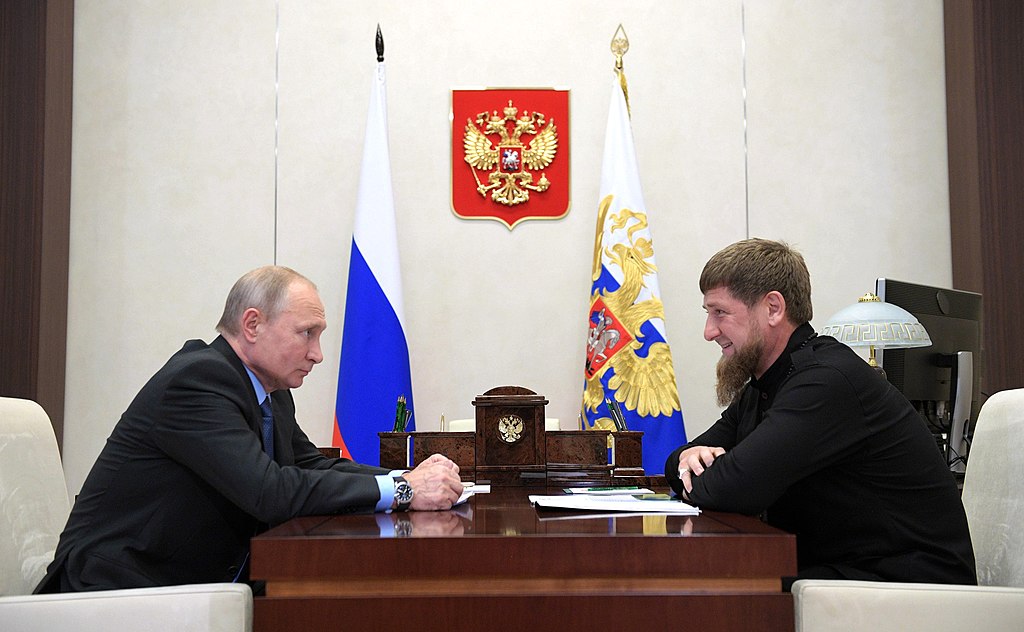Immediately after Russia’s invasion of Ukraine in February 2022, Chechen leader Ramzan Kadyrov loudly announced the active involvement of Chechen security forces in it. Units of the Russian army and the Interior Ministry for Chechnya, which de facto report to Kadyrov personally, lined the grounds of his residence in the centre of the Chechen capital. Kadyrov said at the time that 12,000 Chechen volunteers were ready to leave for any special operation in the interests of Russia.
Since then, various sources have claimed that about 200 Chechens have been killed. The figure for the number of Chechens fighting for Russia is about 10,000 according to Kadyrov. Russian human rights activists put the number at around 3,000.
In September 2022 several women decided to organise a demonstration against sending Chechens to join Russia’s war. In a voice message that circulated on social media at the time, the organisers called on people to come to the central square of the city of Grozny: “They killed us in two wars, aren’t there enough dead, mutilated and crippled?” the woman in the message asks. On the same day, Kadyrov said on his Telegram channel that the women had been detained, a preventive conversation was held with them, and he promised to send their sons to fight in Ukraine.
This was something of an understatement. The human rights group Memorial has since confirmed that the women were taken to Grozny’s City Hall and their husbands forced to beat them. The son of at least one of the women was sent to Ukraine and her husband died a few days later, seemingly of “a broken heart”.
This kind of harsh reaction had an effect: people became afraid to express their opinions, even in front of their long-time friends. Umar from Grozny says that recently a friend of his sent a meme about the war in Ukraine into a group chat room, and five minutes later deleted it. “This has never happened before, everyone knows everyone in this chat room and before the war everyone trusted each other,” said Umar.
That said, one activist of a Russian human rights organisation believes that the situation of free speech in Chechnya has changed, but not necessarily for the worse. She confirms that people are less likely to express their discontent with the authorities in public, but among trusted circles, criticism of the Chechen authorities has become harsher. She says that even those who used to be apolitical are now speaking out against the actions of the authorities. She believes that the people who fear that their sons who survived the Chechen wars or were born later will die in a new, “alien war”.
According to Marina, a 33-year-old who works at a public institution in Chechnya, “not a single lunch with friends goes by without talking about Ukraine”. She follows all the news from the front and cheers for Ukraine’s victory. Most of Marina’s friends also support Ukraine and want Russia to lose. When she and her friends discuss Ukraine in a café, everyone keeps asking each other to keep their voices down.
“Ukraine is going through the same thing we went through. The same rhetoric, only we were accused of being a nation of terrorists, while the Ukrainians are ‘Nazis’,” Marina said. She is sure that among Chechens there is no patriotism toward Russia. “Where does it come from?” she asked rhetorically.
“The Chechens we see on social networks and state channels talking about love for Russia are people who need something from the authorities. They pursue purely material goals.”
Marina personally knows Chechens who went to Ukraine for money but that was at the very beginning of the war (the minimum amount paid by the Russian government for participation in the war is 195,000 rubles monthly, about $2615),
Umar, 43, a courier from Grozny, tells of his neighbour who was sent to Ukraine recently. “He liked to drink and make noise. He was taken to prison and stayed there for several months. Then he was offered: either you go to Ukraine or we put you in jail for a long time. He agreed to Ukraine. I recently saw a picture of him standing somewhere in the Luhansk region of Ukraine, in a Russian military uniform, with a submachine gun in his hands”. According to Umar, there are many such cases.
There are also those in Chechnya who think differently and support Kadyrov’s army. These are mostly families of Chechens who are fighting on the side of Russia. “They are not rooting for Russia’s victory, but for their family members,” said Tamara, a 49-year-old housewife from a Chechen village. Those whose children have gone to fight in Ukraine sincerely want them to return home and support them. These parents need to explain to themselves that their sons are not risking their lives for nothing, and they speak “the language of television” Tamara said. Most of their rhetoric boils down to a line they’ve been told that Russia was forced to attack and that “the (Russian) government isn’t stupid”.
For the residents of Grozny, which was rebuilt after almost total destruction in the early 2000s, today they live ordinary, peaceful lives. As in other Russian cities, there is almost no indication that the country is waging an aggressive war against its neighbour. It is almost the same war Russia waged against Chechnya in the 1990s and 2000s when it fought for independence. The graffiti on the walls that used to say “Welcome to hell”, left for the Russian soldiers by Chechen fighters for independence, has been replaced by murals depicting Kadyrov and his men. But there is little faith in the sincerity of Kadyrov’s love for the Russian leadership. Marina says:
“Kadyrov has no patriotism for Russia. All he protects is his position and his stability.”
This article is written by a journalist from Chechnya. For their safety they wished to remain anonymous and excluded identifying features of those they spoke to as well





